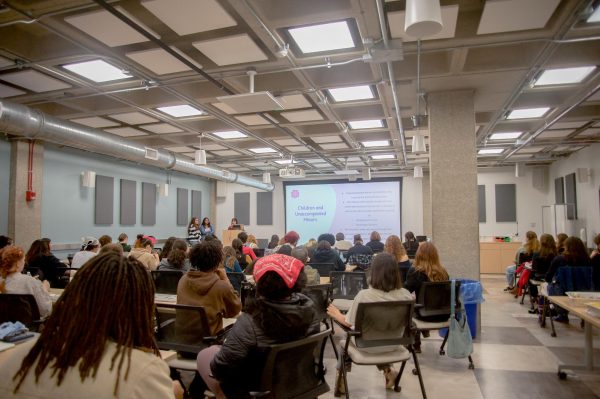NEDA Week Reminds Students to Be Mindful
Editor’s note: This piece contains mention of eating disorders and associated behaviors.
Many who experience eating disorders suffer in silence. Eating disorders can lead to feelings of unworthiness, hopelessness, and loneliness. When coping with an eating disorder, your mind can convince you that you are not sick enough and that things have to be worse before you can reach out for help and support.
The National Eating Disorder Association offers programs and services such as an online screening tool, a helpline, and walks for fundraising and advocacy. The organization’s website also has search features to find treatment, support groups, and research studies. Each year, NEDA dedicates a week to raising awareness about eating disorders and encouraging discourse to destigmatize and combat the stereotypes around them.
This year, National Eating Disorder Awareness Week is Feb. 24 – March 1. The week is themed “Come As You Are: Hindsight 20/20.” It encourages individuals to reflect on their journey with self-acceptance and acknowledge the heavy stigma around eating disorders. This coming week is all about inclusivity, as well as recognizing that everyone’s experiences are valid, no matter where they are in their stages of recovery. It’s about learning to accept yourself and make peace with your body.
We need to talk more about eating disorders. People need to be aware of the symptoms and signals early on, to recognize when friends or family display red flags, and to remember that it is not shameful to be struggling. Anorexia has the highest mortality rate of any mental illness, and all eating disorders are accompanied with severe and damaging side effects. Binge eating disorder is the most common eating disorder in the United States. Every 62 minutes, at least one person dies as the result of an eating disorder. Eating disorders do not discriminate based on sex, gender, race, age, socioeconomic group, or size. Yet eating disorders are often dismissed as insignificant.
There are many barriers to obtaining a diagnosis, such as limited access to health care and lack of knowledge on the part of doctors. Even then, the diagnostic criteria for eating disorders are incredibly narrow and specific. Without a diagnosis, individuals may feel invalidated and be denied insurance coverage for treatment. On top of all this, stigma exists as a barrier that deters individuals from seeking help. The system fails so many people.
An eating disorder is not a body type, shape, weight, or a particular Body Mass Index. People should not feel like they have to justify themselves and their illness because they deserve to get help no matter what. Who the person is matters more than how they look. The path to self-love is difficult, especially in a world where self-criticism is so normal. Recovery is an unbelievably challenging process to navigate, but one that’s worth its darkness. It is not linear, but it becomes more beautiful the longer you stick with it.
We at Oberlin can do better. We need to be more mindful of what we say, because casual comments can be triggering. We do not need to label foods as “good” or “bad,” nor do we need to list the calorie counts directly next to the name of the foods on dining hall menus. We need to stop the fatphobia here on campus.
Oftentimes, Oberlin students tend to brag about not prioritizing nutrition or forgetting to eat. They compete to be that person with the most strenuous schedule. Food is non-negotiable. We need to avoid bragging about disordered habits and instead be mindful of the messages we send to ourselves and those around us.
Visit nationaleatingdisorders.org and use its screening tool to find resources available to you.
Nationaleatingdisorders.org helpline: (800) 931-2237.



